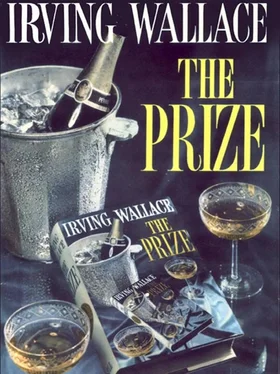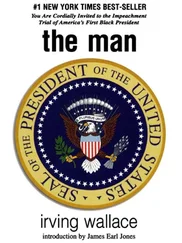‘But that’s the point, you haven’t written at all, not for three or four years,’ Sue Wiley shot back triumphantly.
This brazen public exposure, by a sensation-mongering bitch, brought the heat of colour to Craig’s face. He found it hard to contain his fury. ‘Now, wait a minute, young lady-’ he began.
Before he could go on, to what regrettable end he knew not, he was interrupted.
‘Mr. Craig, may I have the floor for a moment?’ The request, clear and confident, had come from Count Bertil Jacobsson, who had raised himself to his feet and now stood beside Sue Wiley.
Craig bit his lower lip, and held his tongue.
Jacobsson had moved apart from Sue Wiley, so that he could address not only her but the rest of the press.
‘When unfounded accusations, such as those just made by the lady press member, are directed against an honoured guest from abroad, I feel that it is my duty-and not his-my duty as a host of the Nobel Foundation and a representative of His Majesty, to intervene and make the reply.’ Jacobsson studied the hushed audience with awesome patriarchal gravity. ‘Let me make clear our position. We of the Nobel Foundation do not judge our nominees and laureates by their personalities or characters or eccentricities. We are not interested in whether our winners are drunkards, heroin addicts, or polygamists. Our judgment is not based upon human behaviour. That is a task for Sunday schools. Our decision, in literature, is based solely on whether or not we think we are satisfying Mr. Nobel’s desire to reward “the most oustanding work of an idealistic tendency”.’
‘What about freedom of the press and what readers want to know?’ demanded Sue Wiley. ‘We’re servants of the public. Why did you invite us to this press conference anyway?’
‘We invited you, and everyone,’ said Jacobsson calmly, ‘to meet a laureate but not so that you could malign him with inference, gossip, and unseemly questions. I do not know Mr. Craig’s personal habits, and what is more, I am not interested in them. I am interested in his genius, and I want you to be, also, and that is why I invited you here this afternoon.’ He studied the members of the Swedish press corps, and suddenly a smile broke across his wrinkled features. ‘And suppose Miss Wiley could prove that Mr. Craig, is indeed, a most obnoxious drunkard-which you can see he is not-but suppose she could prove it? What would be proved, after all? The majority of us in this room are Swedes. I should wager there is not a teetotaler in the group. What true Swede would claim that he does not, on occasion, have his love affair with schnapps or beer? Are we children? Or do we possess the mature tolerance of an Abraham Lincoln? Do you recollect the well-known Lincoln anecdote? Gossips had warned him that his most successful general, Ulysses S. Grant, was a poor drunken imbecile. “If I knew what brand of whisky he drinks,” said Lincoln, “I would send a barrel or so to some other generals”.’
Laughter rattled through the room, and Sue Wiley blinked furiously.
With aristocratic ease, Jacobsson went on. ‘I can speak to you with some authority of previous Nobel laureates in literature, whom I have met and known personally and respected highly. Needless to say, I would not wager that all of them were abstainers and prohibitionists. I remember when we notified one Scandinavian author that he had won the Nobel Prize, he went on a two-week drunk. It is a fact. It is also a fact that when Knut Hamsun came from Norway to get his literary award in 1920, he was thoroughly inebriated the night of the dignified Ceremony. He pulled the whiskers of an elderly male member of the Swedish Academy, and he snapped old Selma Lagerlöf’s girdle!’
There was laughter once more, and much note taking, and before Sue Wiley could speak again, Jacobsson hastily added, ‘We have taken enough of Mr. Craig’s time, and surely, we have made him thirsty. While I join him in toasting Mr. Hamsun, I suggest you write your stories. Det är allt. The press conference stands adjourned!’
Afterwards, after the Press Club had been cleared of reporters, and the Marceaus, Stratman, Farelli, and Garrett had gone off with Krantz and the attachés, Andrew Craig lingered behind. The drinks had disappeared, so he leaned against a wall of the cloakroom and smoked, watching Mrs. Steen and Count Jacobsson gather up their papers.
When Mrs. Steen said her goodbye, Craig joined the old Count.
‘Thank you,’ he said.
‘For what? Everything I told them, I will tell you. It is true.’
‘You may have put yourself out on a limb. What if I am a drunkard? It would make a fool of you.’
‘I am sure you are not. And if you are, I could not care less. Every few years, we have a witch like Miss Wiley, and she must be put down. It is dangerous, that sensationalism. It obscures all that is important here.’
‘Well, at any rate, you were right about one thing-you did make me thirsty. Do you know where I can buy some liquor to take to the hotel?’
‘I will direct you. We will walk together.’
They went down the stairs and into the street. It was late afternoon, and already the darkness of winter had fallen on the city. A chill wind whipped up from the canal, and both men buttoned their overcoats. They walked across the square, Craig chewing his empty pipe, Jacobsson swinging his cane in a wide arc and thumping it on the brick pavement, and then they entered Fredsgatan, passing Fritze’s, who advertised themselves booksellers to the court, and turned the corner into Malmskillnadsgatan, where they found the shop.
Craig fell in line, behind several Swedes, at the long counter of the shop, and waited patiently, studying the half-filled shelves behind. When it was his turn, he requested three bottles of Ballantine’s.
Later, returning to the Grand Hotel along the canal, Craig wondered if the anecdote about Knut Hamsun were true, and Jacobsson said that he had witnessed it. For a moment, Jacobsson considered revealing to Craig a more recent incident: that of the elderly literary laureate who had arrived in Stockholm with two bountiful young ladies who, while introduced as his secretary and his interpreter, were rumoured to be his two current mistresses. It had been a situation fraught with the possibilities of scandal, but Jacobsson had artfully managed to hide it from the press.
Now, Jacobsson decided against alluding to the lechery. Instead, he said that the details of the Hamsun anecdote were carefully recorded in his Notes, and then he told Craig of his Notes, and did not conceal his envy for writers who actually wrote books. He spoke fondly of his quarters, above the Nobel Foundation, and of his private museum, which was really his study, filled with autographed photographs and memorabilia of previous Nobel laureates. He hoped that Craig would find time to pay a visit to his museum, and Craig, with growing affection for the old gentleman, said that he would.
‘Do you think your press conferences were successful today?’ Craig asked.
‘Among the best in a decade,’ said Jacobsson. ‘I looked in on each one, you know. I believe you met Dr. Farelli?’
‘The medicine man?’
‘Yes. He made an interesting remark in his interview. Someone asked him what he thought was the most serious omission in the history of the medical awards. He said Sigmund Freud. Of course, he could not know the truth. I think it might amuse you.’
‘What is it?’
‘Sigmund Freud was never formally nominated for the medical award, true-but once, he was nominated for the Nobel Prize in literature. Did you know that?’
‘Are you serious?’
‘Absolutely. It is a fact. And, for that matter, why not? I should guess he was as qualified for that award as Winston Churchill. In our literary awards, we respect gifted amateurs.’
Читать дальше












